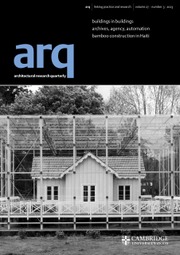No CrossRef data available.
Article contents
Designing in the Context of Time: Why Annetta Pedretti’s cybernetic-architectural practice at 25 Princelet Street matters
Published online by Cambridge University Press: 08 April 2025
Extract
Annetta Pedretti studied cybernetics and architecture early in the 1970s – beginning at the Architectural Association in London and later culminating in a Ph.D in 1981 at Brunel University – and her training continued to influence her lifelong practice just as much as her everyday surroundings. From 1980 to 2018, Pedretti’s life and work revolved around one particular site: 25 Princelet Street in Spitalfields, Tower Hamlets. During these years, Spitalfields was grappling withquestions of heritage, conservation, and change that were taking place in response to intensifying gentrification, all bound by particular ideas about futures and time. Pedretti spoke very early on about faulty assumptions about time and the need for ‘jerking ourselves out of the habit of taking time as a given’ and ‘extracting time from the relations, e.g., economics, in which we have allowed it to be seized up and used up’. In this paper, I turn to what Pedretti called her ‘intermedia’ practice. I follow a thread in her work – from her experiments in design writing and running a printing press, to flag-making as a form of protest, to the long-spanning project of repairing and remaking the house at Princelet Street – that points towards her interest in reclaiming time as a form of designerly resistance. In so doing, I will explore how these practices come together, exploring the broader challenges of navigating the dialectical complexity related to negotiating between the ‘lived time’ (experiential) of entities fundamental to their internal processes of unfolding and ‘clock time’(measurable time) that is significant for social negotiations such as design decisions related to conservation or development. Pedretti’s work is an invitation to imagine a reflexive practice in which claiming time and working contra to different forms of oppression becomes about writing, repairing, working with the evolving community, and working on the self. All of these processes are recursively entangled, unfolding, creating feedback and feedforward loops that connect in a myriad of different ways.
Information
- Type
- Full Paper
- Information
- Creative Commons
- This is an Open Access article, distributed under the terms of the Creative Commons Attribution licence (http://creativecommons.org/licenses/by/4.0), which permits unrestricted re-use, distribution and reproduction, provided the original article is properly cited.
- Copyright
- © The Author(s), 2025. Published by Cambridge University Press

